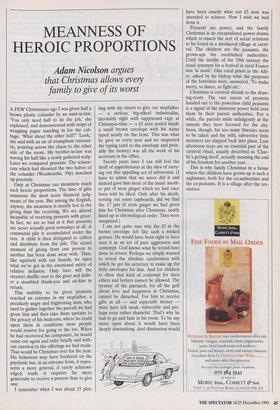MEANNESS OF HEROIC PROPORTIONS
Adam Nicolson argues
that Christmas allows every family to give of its worst
A FEW Christmases ago I was given half a brown plastic colander by an aunt-in-law. `You only need half to do the job,' she explained, and demonstrated with strips of wrapping paper standing in for the cab- bage. 'What about the other half?' Look,' she said with an air of triumphant rational- ity, pointing across the chaos to the other side of the room. My brother-in-law was waving his half like a newly gathered scalp. Later we compared presents. The scissor- cuts which had divorced the two halves of the colander (Woolworths, 39p) matched up precisely.
Only at Christmas can meanness reach such heroic proportions. The time of gifts summons the most acute financial judg- ments of the year. But among the English, anyway, the meanness is usually less in the giving than the receiving. We are almost incapable of receiving presents with grace. In fact, we are so bad at it that presents are never actually given nowadays at all. A communal pile is accumulated under the tree. A child is then delegated to collect and distribute from the pile. The actual moment of giving from one person to another has been done away with. Then, like squirrels with our hoards, we open what we've got in the emotional safety of relative isolation. Only later will the receiver shuffle over to the giver and deliv- er a stumbled thank-you and air-kiss in return.
This inability to be given presents reached an extreme in my stepfather, a peculiarly angry and frightening man, who used to gather together the parcels we had given him and then take them upstairs to the privacy of his bedroom, where he could open them in conditions most people would reserve for going to the loo. When he had recovered his composure, he would come out again and refer briefly and with- out emotion to the offerings we had made. That would be Christmas over for the year. His behaviour may have bordered on the psychotic but, in an extreme form, it repre- sents a more general, if rarely acknowl- edged, truth: it requires far more generosity to receive a present than to give one.
I remember when I was about 15 plot- ting with my sisters to give our stepfather — a serious, big-wheel industrialist, inevitably tight with suppressed rage at Christmas-time — a £5 note sealed inside a small brown envelope with his name typed neatly on the front. This was what he gave us every year and we suspected the typing (and so the envelope and prob- ably the money) was all the work of his secretary in the office.
Twenty years later I can still feel the thrill of apprehension at the idea of carry- ing out this appalling act of subversion. (I have to admit that we never did it and instead gave him more of the usual: anoth- er pot of stem ginger which we had once been told he liked. Only after his death, sorting out some cupboards, did we find the 17 jars of stem ginger we had given him for Christmas after Christmas, neatly lined up in chronological order. They were unopened.)
I am not quite sure why the £5 in the brown envelope felt like such a wicked gesture. He would have been right to have seen it as an act of pure aggression and contempt. God knows what he would have done in return. Perhaps we simply wanted to reveal the absolute carelessness with which he got his secretary to make up the little envelopes for him. And for children to show that kind of contempt for their elders and betters cannot be allowed. The tyranny of the patriarch, for all the guff about love and happiness at Christmas, cannot be disturbed. For him to receive gifts at all — and especially money must have felt weak, vulnerable and per- haps even rather shameful. That's why he had to go and hide in his room. To be any more open about it would have been deeply diminishing. And diminution would
have been exactly what our £5 note was intended to achieve. Now I wish we had done it.
Presents are power, and the family Christmas is an encapsulated power-drama which re-enacts the sort of social relations to be found in a mediaeval village at carni- val. The children are the peasants, the grown-ups the established authorities. Until the middle of the 19th century the usual synonym for a festival in rural France was `la riotee', One rural priest in the Alli- er, asked by his bishop what the purposes of the festivities were, answered, 'To make merry, to dance, to fight etc.'
Christmas is carnival shrunk to the draw- ing-room. The vast excess of presents handed out to the powerless child peasants is a signal of the immense power held over them by their parent authorities. For a while, the parents smile indulgently at the misrule they have licensed for the day. Soon, though, far too many liberties seem to be taken and the wild, subversive little monsters are slapped back into place. Late afternoon tears are an essential part of the carnival ritual, usually described as 'Char- lie's getting tired', actually meaning the end of his freedom for another year.
This is why family Christmas in a house where the children have grown up is such a nightmare, both for the ex-authorities and the ex-peasants. It is a village after the rev- olution.










































































































 Previous page
Previous page